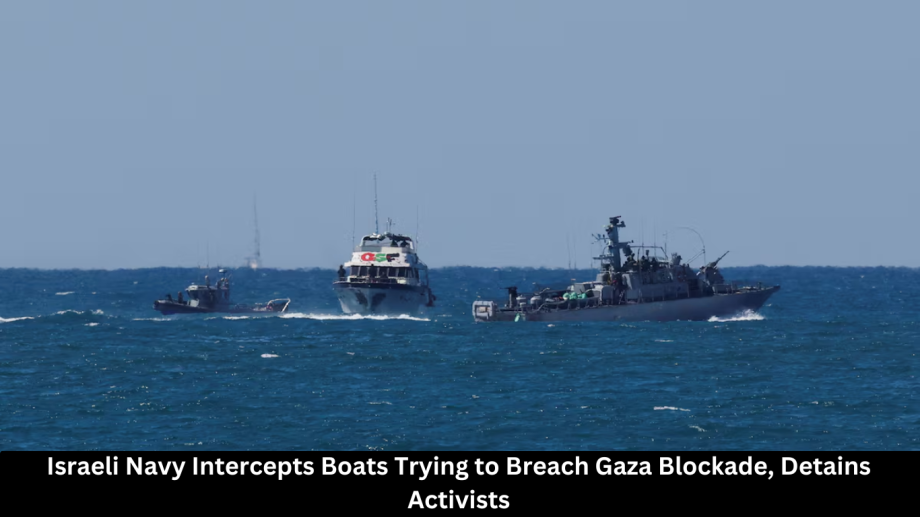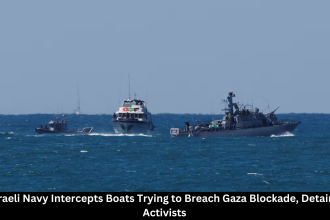The Israeli Navy has intercepted a flotilla of boats attempting to breach the long-standing naval blockade of Gaza, detaining a group of international activists onboard.
- Background: Understanding the Gaza Blockade
- The Latest Incident: What Happened
- Who Were the Activists?
- Israel’s Response
- International Reaction
- Legal and Ethical Dimensions
- Humanitarian Impact on Gaza
- The Political Context
- Historical Precedents: Flotilla Activism and Israel’s Blockade
- Security Versus Humanitarianism: The Ongoing Debate
- Regional and Diplomatic Implications
- The Role of Media and Public Opinion
- Looking Ahead: What Happens Next?
- Frequently Asked Question
- Why did the Israeli Navy intercept the boats?
- What was the purpose of the boats heading to Gaza?
- Who were the activists on board?
- What happened after the interception?
- Is Israel’s blockade of Gaza legal under international law?
- How has the international community responded?
- What impact does this incident have on the Gaza situation?
- Conclusion
The event, which has drawn significant international attention, reignites debates over the legality and morality of Israel’s blockade on Gaza and the efforts of activists who seek to challenge it.
This article explores the details of the interception, the motivations behind the mission, reactions from Israel and global observers, and the broader implications for the Gaza conflict and regional stability.
More Read: Gold Surges to All-Time High Amid US Government Shutdown Fears and Fed Rate Cut Expectations
Background: Understanding the Gaza Blockade
The Gaza blockade was imposed by Israel in 2007 after Hamas, an Islamist political and militant group, took control of the Gaza Strip. Israel and Egypt jointly enforce the blockade, citing security concerns and the need to prevent weapons smuggling into the territory.
Israel argues that the blockade is essential for its security, given that Hamas and other militant groups have repeatedly launched rocket attacks and conducted cross-border operations against Israeli targets.
However, critics—including international human rights organizations—describe the blockade as collective punishment, restricting the movement of goods and people and worsening humanitarian conditions in Gaza.
According to the United Nations, more than two million Palestinians in Gaza face limited access to clean water, electricity, and medical supplies.
Repeated conflicts between Israel and armed groups in Gaza have deepened the crisis, prompting international activists to organize flotillas aimed at delivering humanitarian aid and symbolically breaking the blockade.
The Latest Incident: What Happened
The Israeli Navy reported that several small vessels were intercepted off the coast of Gaza after they ignored repeated warnings not to enter the restricted maritime zone.
Israeli authorities stated that the vessels were rerouted to the port of Ashdod, where security inspections and detentions took place.
A spokesperson for the Israel Defense Forces (IDF) said the navy carried out the operation “in accordance with international law and without the use of unnecessary force.”
According to the statement, the activists were detained peacefully and transferred for questioning by Israeli security agencies.
Activist organizers, however, claim that the boats carried humanitarian supplies, including medical aid and food, intended for Gaza’s residents. They argue that their mission was peaceful and aimed to raise awareness about the humanitarian impact of the blockade.
Who Were the Activists?
The intercepted flotilla reportedly included international participants from Europe, North America, and the Middle East. Many of them were affiliated with non-governmental organizations advocating for Palestinian rights, maritime freedom, and humanitarian assistance.
These activists often view their missions as a form of nonviolent resistance. Some belong to coalitions that have previously organized similar expeditions, such as the Freedom Flotilla Coalition, which gained global attention after the Mavi Marmara incident in 2010.
In that case, Israeli commandos boarded a Turkish-led vessel, resulting in the deaths of several activists and widespread diplomatic fallout.
The recent flotilla was smaller in scale but carried the same symbolic message: a direct challenge to Israel’s control of Gaza’s maritime access.
Israel’s Response
Israeli officials have defended the interception as a necessary enforcement measure. The navy maintains that all vessels attempting to enter Gaza waters without authorization pose potential security threats, as they could be exploited to smuggle weapons or materials used in militant activities.
An IDF statement emphasized:
“Any attempt to breach the lawful naval blockade is a violation of Israeli and international maritime regulations. The Israeli Navy will continue to act decisively to protect the security of the State of Israel and its citizens.”
Israel has repeatedly offered to deliver any humanitarian cargo through official land crossings after inspection, claiming that direct shipments to Gaza’s ports are prohibited for security reasons.
International Reaction
The interception has sparked international debate and condemnation from various quarters. Activist groups and human rights organizations have accused Israel of violating maritime rights and humanitarian principles.
Amnesty International issued a statement calling for the immediate release of the detained activists and an end to what it described as the “illegal and inhumane blockade of Gaza.” Meanwhile, the United Nations reiterated calls for both sides to respect international law and avoid escalating tensions.
Several governments have expressed concern, urging restraint and transparency in handling the detained individuals. European diplomats have requested access to their nationals, while regional actors, including Turkey and Qatar, have condemned the interception as an “act of aggression.”
Legal and Ethical Dimensions
The legality of Israel’s blockade and the interception of vessels bound for Gaza has been the subject of extensive international legal debate.
The UN Palmer Report (2011), which investigated the 2010 Mavi Marmara incident, concluded that Israel’s naval blockade of Gaza was lawful under international law, citing the right of a state to prevent arms smuggling during an armed conflict. However, the same report criticized Israel’s use of force and treatment of activists.
Human rights advocates argue that even if the blockade is technically legal, its humanitarian impact violates broader principles of international humanitarian law. They contend that the restrictions imposed on Gaza’s population amount to collective punishment and hinder civilian life.
This tension between security and humanitarianism remains central to every debate about Gaza’s blockade and flotilla missions.
Humanitarian Impact on Gaza
The Gaza Strip remains one of the most densely populated and impoverished regions in the world. Over 80% of its residents rely on international aid, according to UN data. Electricity shortages, limited access to clean water, and restrictions on medical supplies continue to define daily life.
While Israel allows goods into Gaza through controlled land crossings, the volume is tightly regulated, and exports from Gaza are severely limited. This has stifled economic growth and exacerbated unemployment, which remains among the highest globally.
Activists organizing flotillas argue that their efforts are not just about aid delivery but also about drawing global attention to these living conditions and pressing for policy changes.
The Political Context
The latest interception comes amid heightened tensions in the region. Periodic escalations between Israel and Hamas have kept Gaza in the headlines.
The blockade serves as both a physical and political barrier—aimed at weakening Hamas while also isolating Gaza from the broader Palestinian political landscape.
The Palestinian Authority, based in the West Bank, has called for the blockade’s end, arguing that it undermines Palestinian unity and fuels humanitarian suffering.
International mediators, including Egypt, Qatar, and the United Nations, have attempted to broker long-term truces that might ease restrictions in exchange for security guarantees.
However, with no comprehensive peace agreement in sight, incidents like the flotilla interception highlight the persistent volatility of the Gaza situation.
Historical Precedents: Flotilla Activism and Israel’s Blockade
Since 2008, multiple flotilla missions have attempted to reach Gaza by sea. The most notable, the 2010 Mavi Marmara incident, resulted in the deaths of nine Turkish activists after Israeli forces boarded the ship.
The event led to a severe diplomatic rift between Israel and Turkey and triggered international condemnation.
Subsequent flotillas were intercepted without fatalities but continued to attract global media attention. These missions blend humanitarian activism with political symbolism, often framing themselves as peaceful resistance against what organizers call an unjust blockade.
Israel, on the other hand, views these operations as deliberate provocations that serve political, rather than purely humanitarian, goals.
Security Versus Humanitarianism: The Ongoing Debate
The heart of the issue lies in balancing security concerns with humanitarian rights. Israel’s government argues that unrestricted maritime access to Gaza could enable Hamas to import weapons and military-grade materials.
Critics counter that Israel’s controls extend far beyond legitimate security measures, effectively strangling Gaza’s economy and trapping civilians in a perpetual crisis.
This dichotomy has fueled decades of disagreement among policymakers, international law experts, and humanitarian organizations.
Regional and Diplomatic Implications
Every interception of a Gaza-bound flotilla reverberates beyond Israel and Gaza. It affects Israel’s diplomatic standing, regional alliances, and global image.
Nations sympathetic to the Palestinian cause often use such incidents to criticize Israel’s broader policies in the occupied territories.
At the same time, Israel’s allies, particularly the United States, tend to support its right to self-defense while urging restraint. The Biden administration has reiterated its backing of Israel’s security measures but continues to call for steps that alleviate humanitarian suffering in Gaza.
The Role of Media and Public Opinion
Media coverage of flotilla incidents plays a crucial role in shaping global perceptions. Activists rely on publicity to amplify their message, while Israel works to control the narrative by emphasizing its legal rights and security imperatives.
Social media has intensified this battle for public opinion, with videos, statements, and eyewitness accounts spreading rapidly across digital platforms. The result is a polarized discourse that mirrors broader divisions over the Israeli-Palestinian conflict.
Looking Ahead: What Happens Next?
Following the latest interception, detained activists are expected to face deportation after legal processing. Israel has indicated that humanitarian supplies seized from the boats will be inspected and potentially transferred to Gaza via official channels.
Observers anticipate further international scrutiny and renewed calls for easing restrictions on Gaza. Humanitarian groups may plan additional missions, underscoring the enduring appeal of symbolic activism in confronting geopolitical realities.
For Israel, each flotilla represents not only a logistical challenge but also a diplomatic test. Balancing national security with global opinion remains an ongoing struggle.
Frequently Asked Question
Why did the Israeli Navy intercept the boats?
The Israeli Navy intercepted the boats because they were attempting to enter Gaza’s territorial waters, which are under a naval blockade imposed by Israel since 2007. Israel maintains that the blockade is a security measure designed to prevent weapons smuggling to Hamas and other militant groups operating in Gaza. The navy claimed the interception followed international maritime law and that the vessels were redirected peacefully.
What was the purpose of the boats heading to Gaza?
The flotilla carried international activists and humanitarian supplies, such as food, medicine, and medical equipment. The mission’s organizers said their goal was to deliver aid and protest the Israeli blockade, which they argue has caused severe humanitarian suffering in Gaza. These efforts are often symbolic acts of nonviolent resistance to highlight the impact of the blockade.
Who were the activists on board?
The detained activists came from various countries, including European nations, the United States, and Middle Eastern states. Many are part of organizations advocating for Palestinian rights and humanitarian access to Gaza. Some belong to well-known coalitions like the Freedom Flotilla Coalition, which has organized multiple attempts to reach Gaza by sea since 2010.
What happened after the interception?
After intercepting the vessels, the Israeli Navy escorted them to the port of Ashdod, where the boats and cargo were inspected. The activists were detained for questioning and are expected to be deported after legal processing. Israeli authorities stated that any legitimate humanitarian goods would be delivered to Gaza through official land crossings.
Is Israel’s blockade of Gaza legal under international law?
The legality of the Gaza blockade is a matter of ongoing international debate. According to the UN Palmer Report (2011), Israel’s blockade is legal under international law as a measure to prevent arms smuggling during an armed conflict. However, many human rights organizations argue that the blockade amounts to collective punishment, violating humanitarian principles by restricting civilian movement and essential goods.
How has the international community responded?
Reactions have been mixed. Human rights groups such as Amnesty International and Human Rights Watch have condemned the interception and called for the activists’ release, urging an end to the Gaza blockade. Meanwhile, Israel’s allies, including the United States, have defended its right to enforce security measures while encouraging steps to improve humanitarian conditions in Gaza. Several European governments have requested consular access to their detained nationals.
What impact does this incident have on the Gaza situation?
The interception highlights the ongoing tensions surrounding Gaza’s blockade and the deep divisions in international opinion. It underscores the humanitarian crisis in Gaza, where over two million people face shortages of food, clean water, and medical supplies. The event also keeps global attention on the Israeli-Palestinian conflict, emphasizing the challenges of balancing security, humanitarian concerns, and diplomatic pressure in the region.
Conclusion
The interception of boats attempting to breach the Gaza blockade once again underscores the enduring complexity of the Israeli-Palestinian conflict. For Israel, the blockade is a vital security measure. For activists and Palestinians, it symbolizes collective punishment and humanitarian injustice.
As long as Gaza remains under blockade and its people face dire living conditions, efforts to challenge Israel’s policies—by sea or otherwise—are likely to continue.
Whether through diplomacy, activism, or confrontation, the world’s attention remains fixed on Gaza’s shores, where security imperatives and humanitarian values collide in one of the world’s most enduring conflicts.








